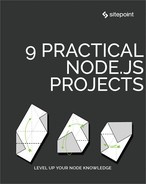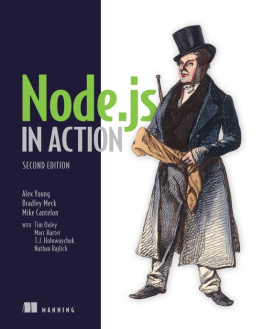James Hibbard - Node.js: The Collection
Here you can read online James Hibbard - Node.js: The Collection full text of the book (entire story) in english for free. Download pdf and epub, get meaning, cover and reviews about this ebook. year: 2018, publisher: SitePoint, genre: Home and family. Description of the work, (preface) as well as reviews are available. Best literature library LitArk.com created for fans of good reading and offers a wide selection of genres:
Romance novel
Science fiction
Adventure
Detective
Science
History
Home and family
Prose
Art
Politics
Computer
Non-fiction
Religion
Business
Children
Humor
Choose a favorite category and find really read worthwhile books. Enjoy immersion in the world of imagination, feel the emotions of the characters or learn something new for yourself, make an fascinating discovery.

- Book:Node.js: The Collection
- Author:
- Publisher:SitePoint
- Genre:
- Year:2018
- Rating:5 / 5
- Favourites:Add to favourites
- Your mark:
- 100
- 1
- 2
- 3
- 4
- 5
Node.js: The Collection: summary, description and annotation
We offer to read an annotation, description, summary or preface (depends on what the author of the book "Node.js: The Collection" wrote himself). If you haven't found the necessary information about the book — write in the comments, we will try to find it.
Node.js: The Collection — read online for free the complete book (whole text) full work
Below is the text of the book, divided by pages. System saving the place of the last page read, allows you to conveniently read the book "Node.js: The Collection" online for free, without having to search again every time where you left off. Put a bookmark, and you can go to the page where you finished reading at any time.
Font size:
Interval:
Bookmark:
Copyright 2018 SitePoint Pty. Ltd.
- Cover Design: Alex Walker
All rights reserved. No part of this book may be reproduced, stored in a retrieval system or transmitted in any form or by any means, without the prior written permission of the publisher, except in the case of brief quotations embodied in critical articles or reviews.
The author and publisher have made every effort to ensure the accuracy of the information herein. However, the information contained in this book is sold without warranty, either express or implied. Neither the authors and SitePoint Pty. Ltd., nor its dealers or distributors will be held liable for any damages to be caused either directly or indirectly by the instructions contained in this book, or by the software or hardware products described herein.
Rather than indicating every occurrence of a trademarked name as such, this book uses the names only in an editorial fashion and to the benefit of the trademark owner with no intention of infringement of the trademark.

Published by SitePoint Pty. Ltd.
48 Cambridge Street Collingwood
VIC Australia 3066
Web: www.sitepoint.com
Email: books@sitepoint.com
SitePoint specializes in publishing fun, practical, and easy-to-understand content for web professionals. Visit http://www.sitepoint.com/ to access our blogs, books, newsletters, articles, and community forums. Youll find a stack of information on JavaScript, PHP, design, and more.
While there have been quite a few attempts to get JavaScript working as a server-side language, Node.js (frequently just called Node) has been the first environment that's gained any traction. It's now used by companies such as Netflix, Uber and Paypal to power their web apps. Node allows for blazingly fast performance; thanks to its event loop model, common tasks like network connection and database I/O can be executed very quickly indeed.
From a beginner's point of view, one of Node's obvious advantages is that it uses JavaScript, a ubiquitous language that many developers are comfortable with. If you can write JavaScript for the client-side, writing server-side applications with Node should not be too much of a stretch for you.
This collection contains three books that will help get you up and running with Node. It contains:
- Your First Week With Node.js, which will get started using Node, covering all of the basics.
- 9 Practical Node.js Projects, which offers a selection of hand-on practical projects to develop your skills
- Node.js: Related Tools & Skills, which outlines essential tools and skills that all Node developers should know
This book is for anyone who wants to start learning server-side development with Node.js. Familiarity with JavaScript is assumed, but we don't assume any previous back-end development experience.
Code in this book is displayed using a fixed-width font, like so:
A Perfect Summer's DayIt was a lovely day for a walk in the park.The birds were singing and the kids were all back at school.
Where existing code is required for context, rather than repeat all of it, will be displayed:
function animate() { new_variable = "Hello";}Some lines of code should be entered on one line, but weve had to wrap them because of page constraints. An indicates a line break that exists for formatting purposes only, and should be ignored:
URL.open("http://www.sitepoint.com/responsive-web-design-real-user-testing/?responsive1");Youll notice that weve used certain layout styles throughout this book to signify different types of information. Look out for the following items.
Tips provide helpful little pointers.
Notes are useful asides that are relatedbut not criticalto the topic at hand. Think of them as extra tidbits of information.
... pay attention to these important points.
Warnings highlight any gotchas that are likely to trip you up along the way.

So youve heard of Node.js, but arent quite sure what it is or where it fits into your development workflow. Or maybe youve heard people singing Nodes praises and now youre wondering if its something you need to learn. Perhaps youre familiar with another back-end technology and want to find out whats different about Node.
If that sounds like you, then keep reading. In this article Ill take a beginner-friendly, high-level look at Node.js and its main paradigms. Ill examine Nodes main use cases, as well as the current state of the Node landscape, and offer you a wide range of jumping off points (for further reading) along the way.
Please note that, throughout the chapter, Ill use Node and Node.js interchangeably.
There are plenty of definitions to be found online. Lets take a look at a couple of the more popular ones:
This is what the projects home page has to say:
Node.js is a JavaScript runtime built on Chromes V8 JavaScript engine. Node.js uses an event-driven, non-blocking I/O model that makes it lightweight and efficient.
And this is what StackOverflow has to offer:
Node.js is an event-based, non-blocking, asynchronous I/O framework that uses Googles V8 JavaScript engine and libuv library.
Hmmm, non-blocking I/O, event-driven, asynchronous thats quite a lot to digest in one go. So lets approach this from a different angle and begin by focusing on the other detail that both descriptions mention the V8 JavaScript engine.
The V8 engine is the open-source JavaScript engine that runs in the Chrome, Opera and Vivaldi browsers. It was designed with performance in mind and is responsible for compiling JavaScript directly to native machine code that your computer can execute.
However, when we say that Node is built on the V8 engine, we dont mean that Node programs are executed in a browser. They arent. Rather, the creator of Node (Ryan Dahl) took the V8 engine and enhanced it with various features, such as a file system API, an HTTP library, and a number of operating systemrelated utility methods.
This means that Node.js is a program we can use to execute JavaScript on our computers. In other words, its a JavaScript runtime.
In this next section, well install Node and write a couple of simple programs. Well also look at npm, a package manager that comes bundled with Node.
Many websites will recommend that you head to the official Node download page and grab the Node binaries for your system. While that works, I would suggest that you use a version manager instead. This is a program which allows you to install multiple versions of Node and switch between them at will. There are various advantages to using a version manager. For example, it negates potential permission issues which would otherwise see you installing packages with admin permissions.
Font size:
Interval:
Bookmark:
Similar books «Node.js: The Collection»
Look at similar books to Node.js: The Collection. We have selected literature similar in name and meaning in the hope of providing readers with more options to find new, interesting, not yet read works.
Discussion, reviews of the book Node.js: The Collection and just readers' own opinions. Leave your comments, write what you think about the work, its meaning or the main characters. Specify what exactly you liked and what you didn't like, and why you think so.





